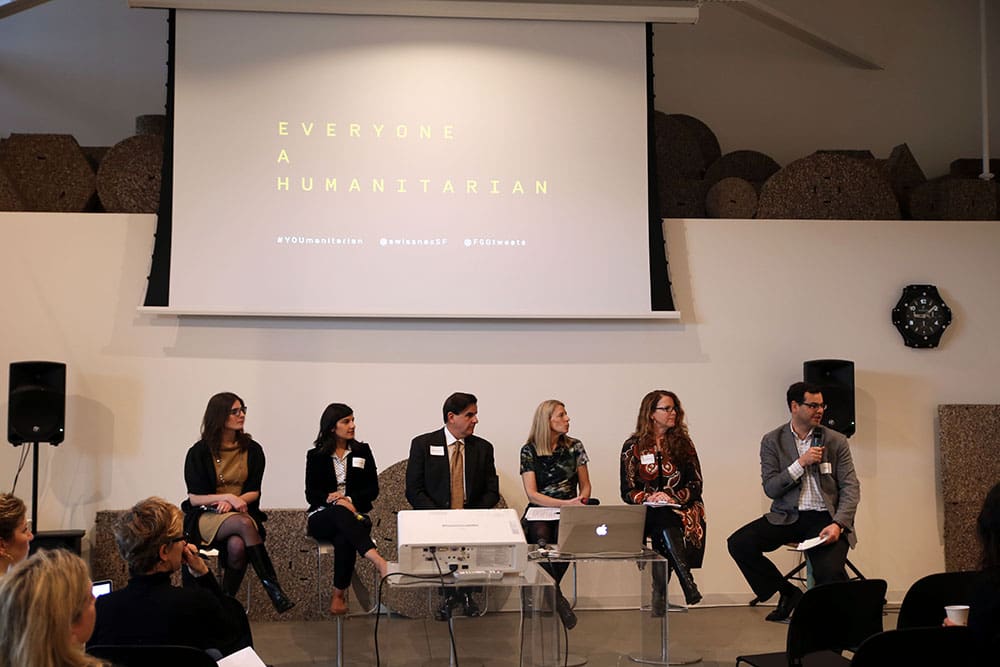FSG Managing Director Philippe Sion recently hosted a panel on the role companies can take in accelerating solutions to the refugee crisis, as part of the Everyone a Humanitarian series, hosted by swissnex in San Francisco.
Inspired by a recent blog written about the role of corporations during the refugee crisis, this panel explored the ways that corporations like Airbnb, Cisco, LinkedIn, and UPS are currently responding to the refugee crisis, including how to partner with large NGOs like Save the Children. The discussion uncovered 4 key themes:
1) Businesses must leverage their core capabilities to achieve social impact
The panelists described how their respective organizations take a shared value approach in addition to employing more traditional philanthropic tools in their humanitarian work. Maryam Ghofraniha, the Head of Global Partnerships and Welcome Talent at LinkedIn For Good, explained that the Welcome Talent program leverages the same technology platform as LinkedIn, and follows the same mission: connecting members of the global workforce to economic opportunity.
Building on the “tech for good” theme, Kathy Mulvany, the Vice President of Corporate Affairs at Cisco, described how the company deploys teams to set up communications infrastructure at refugee sites in Europe along migration routes. This infrastructure improves connectivity for both the relief agencies on the ground and refugees who can contact family members, either ahead of or behind them, in their journey. This work also enables the company to learn from its deployment capabilities and improve its core products and services.
Ed Martinez, President of the UPS Foundation, explained how the company shares its expertise in re-establishing supply chains for the benefit of aid agencies on the ground. It also uses its hand-held tracking tool to expedite the distribution of food aid and to create durable identification cards for refugees in camps. This, in turn, provides new lessons in terms of technology deployment that the company can apply to its more traditional business operations.
2) The refugee crisis is a complex issue that requires a system view
“A system challenge requires system thinking, even if it's hard,” said Carolyn Miles, President & CEO of Save the Children. “It’s about all of us sitting down and asking where do we plug in?”
Understanding the full ecosystem—multiple aid providers, the needs of refugees, and a range of government policies—is critical. Together, organizations must assess and fill gaps, share knowledge, and develop partnerships. Kellie Bentz, the Head of Global Disaster Response and Relief Efforts at Airbnb, said there is “no room for competition” in a crisis like this; actors must collaborate and grasp the complexity of the issue to maximize the impact for those that need the most help.
Taking a system change view also means anticipating what the future might look like. Carolyn Miles described how Save the Children is working with its corporate partners to prepare for an imminent transition: the disappearance of entry level jobs. Many refugees find placements in entry level positions, but with the rise of artificial intelligence and robotization, many of these jobs may be eliminated in coming years. So Save the Children is exploring how to train people for service economy jobs.
3) Collaboration is crucial for impact
Each organization represented on the panel emphasized the need for collaboration in the delivery of their services to refugees. Companies often engage with large international NGOs, such as Save the Children, the International Rescue Committee and Mercy Corps, as well as other nonprofits.
However, many also engage directly with government agencies. Maryam Ghofraniha asserted that "none of LinkedIn's work with refugees would happen without partnerships." When the company launched its Welcome Talent initiative in Sweden, they partnered with the Swedish migration board, and upon the program's expansion to Canada, LinkedIn partnered with IRCC, the Canadian government agency responsible for immigration, refugees, and citizenship. Likewise, UPS provides $1M in annual support to the UNHCR to build the capacity of the agency to respond and support displaced communities.
Business-to-business approaches also exist in countries closer to the crisis. For example, Airbnb is working with TripAdvisor to build tourism opportunities in Amman, Jordan and increase jobs in that sector for both nationals and refugees.
4) Leadership support and employee engagement drive actions
Kellie Bentz recalled the transformative effect that an Airbnb founder’s visit to a refugee camp had on the company: immediately following the visit, Airbnb’s leadership made the decision to scale the Response and Relief team.
For Cisco, employee engagement played a critical role in shaping the company’s involvement. When staff in Hamburg worked with local partners to create doctors’ offices for refugees out of shipping containers, Cisco realized this was an issue close to the hearts of many employees. Viewing employees as partners in global problem solving, Kathy Mulvany said, has helped Cisco focus on how best to apply its technology expertise to this crisis.
FSG will continue its work on the refugee crisis with corporations, foundations, and NGOs by leveraging system change tools, and shared value and collective impact approaches. We also invite you to join us at the Shared Value Leadership Summit in New York on May 9-10 for further discussions on this topic.

